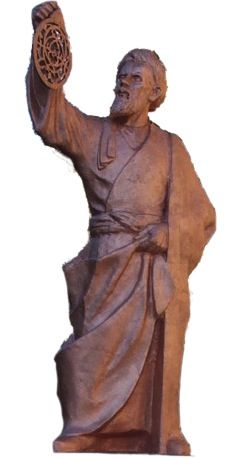 Aristotle
didn't have it. Neither did Pythagoras or Euclid or or other ancient
mathematicians. We're talking about zero, which may sound like nothing,
but, as it turns out, is a really big something. Here's the story.
COUNT LIKE A HINDU
Aristotle
didn't have it. Neither did Pythagoras or Euclid or or other ancient
mathematicians. We're talking about zero, which may sound like nothing,
but, as it turns out, is a really big something. Here's the story.
COUNT LIKE A HINDU
Sometime
in the early ninth century, a mathematician named Muhammad ibn
al-Khwarizmi (circa 780-850 AD) gained a key piece of knowledge that
would eventually earn him the nickname "The Father of Algebra." What he
discovered would also speed up mathematical calculation many times over
and, eventually, make make a host of amazing technological advances
possible, up to and including cars, computers, space travel, and robots.
What was it? The Hindu number system (developed in India). The
system intrigued al-Khwarizmi because it used nine different symbols to
represent numbers, plus a small circle around empty space to represent
shunya- "nothingness." To keep from having to use more and more symbols for larger numbers, the Hindu system was a
place system.
The value of a number could be determined by its place in a row of
numbers: There was a row for 1s, a row for 10s, 100s, 1000s, and so on.
If nine numerals and a circle to represent "nothing" sounds familiar, it
should. Thanks to al-Khwarizmi, the Hindu number system (known in the
West as "Arabic numerals") is the system used in most of the world
today.
A ZERO IN THE HOUSE OF WISDOM

Al-Khwarizmi
knew a good idea when he saw one. He was a scholar and worked in the
House of Wisdom, a combination library, university, research lab, and
translation service in Baghdad. At the time, Abbassid caliphs -who
claimed to be descendants of Abbas, the prophet Mohammad's youngest
uncle- ruled the Persian Empire. They had turned their seat of power,
Baghdad, into the "jewel of the world." Muhammad had exhorted his
followers to "acquire knowledge" and to "seek learning though it be as
far as China." So as Europe descended into the Dark Ages, the caliphs
kept the light of knowledge burning bright. They collected as much of
the world's written knowledge as they could get their hands on and had
it translated into Arabic. At a time when the largest library in Europe
contained far fewer than a thousand volumes, the Abbasids amassed a
library believed to have held a million books.
While working for
the Abbasids in the House of Wisdom, al-Khwarizmi specialized in
astronomy and mathematics. He spent most of his time finding useful,
real-world applications for mathematical concepts and explaining them in
ways that reasonably intelligent non-mathematicians could understand.
And these Hindu numbers opened up a whole new world of mathematical
possibility. And he was especially intrigued by the symbol for
"nothing."
HOLD THAT PLACE!
"The
tenth figure in the shape of a circle," al-Khwarizmi wrote, would help
prevent confusion when it came to balancing household accounts or
parceling out a widow's dowry. The circle was the key: If no numeral
fell into a particular column, the circle served as a placeholder, as
al-Khwarizmi put it, "to keep the rows straight." A merchant (or
mathematician) could run his finger down each column starting from the
right and be confident that the ones, tens, hundreds, and so on, were in
the correct place.
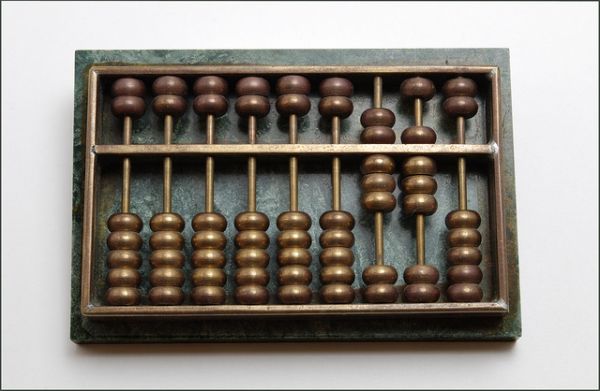
If
this seems less than earth-shaking, consider this: The Hindu system was
based on the abacus, a counting device that some scholars say goes back
to 3,000 BC. The earliest versions used pebbles lined up in columns to
represent 1s, 10s, 100s, 1000s, etc. Later version used beads strung on a
wire inside a frame. With this type of abacus, when you counted past
nine, you flipped one bead in the 10s column and pushed the beads in the
1s column back to nothing. British mathematician Lancelot Hogben
succinctly explained what was so amazing about the Hindu circle:
The
invention of sunya (zero) liberated the human intellect from the prison
bars of the counting frame. Once there was a sign for the empty column,
"carrying over" on a slate or paper was just as easy as carrying over
on an abacus …and it could stretch as far as necessary in either
direction.
That, in a nutshell, is the humble beginning of zero. But a circle used as a placeholder is only half the story about nothing.
ZERO HOUR
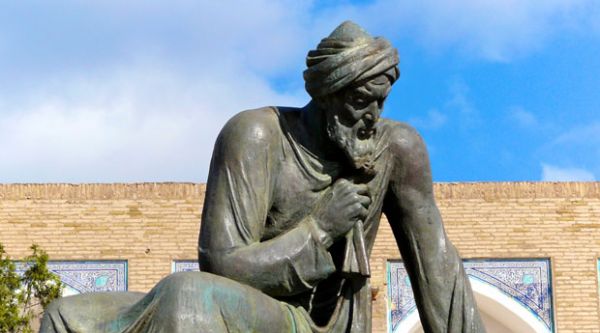
For
a while, the Hindu circle remained a placeholder doing nothing more
than showing that there was nothing in a particular column. But
al-Khwarizmi wasn't content with that and went back to the books. He
studied everything he could find about math from the ancient Greeks and
others, and he began considering the existence of negative numbers, in
particular what happens when you subtract a larger number from a smaller
one. Something about the available literature bugged him. There was
something missing.
Take a problem like 3 - 4 = ___. Everybody had
figured out that the answer was -1. But al-Khwarizmi knew that he
couldn't arrived at that answer by starting at 3 and counting backward
by 4 numbers. When he did that, … 2, 1, -1, -2, …the fourth number was
-2, and that's the wrong answer.
Al-Khwarizmi's "A-ha!" moment
came when he realized there was a missing number, one that signified
"nothing." And -Eureka!- a symbol for nothing was already there in the
Hindu system, stuck at the end of numerals like 10, 20, 30, 100, etc, to
indicate the numeral's place in the column of figures. That circle
signifying "nothing" (
sunya in Sanskrit,
sifr in Arabic, and, in time,
cipher
in Latin) needed to be upgraded from a placeholder to a full-fledged
numeral. Al-Khwarizmi gave zero its rightful place: right between +1 and
-1. He began using the round placeholder (0) as the missing number in
calculations, and suddenly math with negative numbers worked. (His zero
also provoked heated philosophical discussions along the lines of "How
can nothing be represented by something?" but that's a different topic.)
ALGEBRA 1
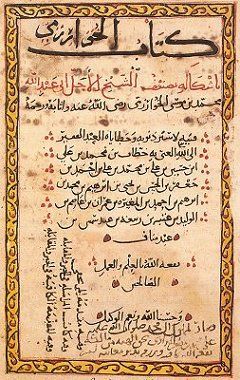
Around 825 AD, al-Khwarizmi wrote a book to explain calculation using the Hindu number system. It was called, fittingly,
On the Calculation with Hindu Numerals.
But al-Khwarizmi didn't rest on his zeroes; he expanded his work,
developing math that included rational and irrational numbers,
negatives, equations, and all the other stuff you've forgotten from
ninth grade.
Around 830 AD, he wrote
al-Kitab al-mukhtasar fi hasib al-jabr wa'l-muqabala (
The Compendious Book on Calculation by Completion and Balancing). The titled gave the world the term "algebra" (from
al-jabr)
and the content gave the world the advance math that went with it.
Al-Khwarizmi's intent wasn't to confuse future generations of middle
school students with abstract equations. In his own words, it was to
explain…
…what is easiest and most useful in
arithmetic, such as men constantly require in cases of inheritance,
legacies, partition, lawsuits, and trade, and in all their dealings with
one another, or where the measuring of lands, the digging of canals,
geometrical computation, and other objects of various sorts and kinds
are concerned.
Al-Khwarizmi's books became popular
throughout the Persian Empire, and not just with mathematicians.
Storekeepers, bankers, builders, architects, and anyone who needed math
to do their jobs made use of Hindu numbers and al-Khwarizmi's algebra.
But it would take a surprisingly long time before his concepts spread
beyond the Muslim world and into Europe.
A POPE FAILS TO CONVERT
Despite
the Biblical injunction to "go forth and multiply," convincing
Christians to use the more advanced system of mathematics would take
about 1,000 years. In al-Khwarizmi's time, (late 8th to mid-9th
century), the Muslim world was in the middle of a Golden Age of
learning. The Christian world: Not so golden. When the Roman Empire
collapsed in 476 AD, in the words of one modern historian, it was as if
"Western Civilization went camping for five hundred years."

During
the Middle Ages, much of the Christian world considered Muslims to be
"heretics" who rejected the "true faith." What, then, could be learned
from them? In the minds of most Europeans, the answer was an unequivocal
"nothing." When it came to math, there was one notable exception: the
10th-century French monk Gerbert of Aurillac. As a young monk, Gerbert
had traveled to Muslim-controlled Spain to study advanced science,
astronomy, and mathematics -disciplines that had been lost to the
Western world. He discovered "Arabic numerals," learned how to use an
abacus, and studied algebra. One man in particular was interested: Otto
the Great, the Holy Roman Emperor. Otto took 20-year-old Gerbert into
his court to tutor his 16-year-old heir, Otto II, in what was then
called "mathesis." Otto II wasn't much of a scholar, but he knew a good
teacher when he saw one. When his own heir, Otto II, needed a tutor,
Gerbert was his man.
Over time Gerber
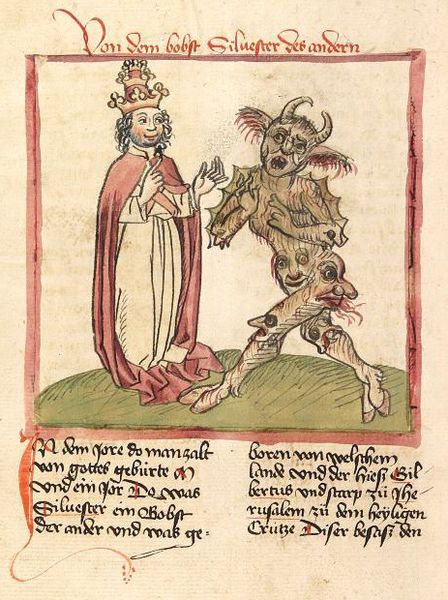
t
became an astronomer, a philosopher, an organ builder, a musical
theoretician, a mathematician, a teacher, and …the world's first French
pope -Sylvester II. In 999, Otto III, in his new role as emperor of the
Holy Roman Empire, used his influence to get his former teacher elected
to the papacy. Gerbert saw his elect has an opportunity to introduce
Arabic numerals into the Church, replacing those unwieldy Roman
numerals. Bad idea: using Arabic "squiggles" to do math was, to many, a
suspicious indication that Sylvester II had gone over to the Dark Side.
Rumors spread that while in Spain the future pope had either learned the
"magic" we call math from his teacher's secret book of magic ..or
studied with the Devil himself.
Whispers that Gerbert's math was
a tool of Satan followed him into the papacy, and though he frequently
displayed his abacus skills and wrote treatises on Arabic math, he died
(in 1003) without convincing either the Church or the masses to adopt
Arabic numerals. In 1096, just before the First Crusade to recapture
Jerusalem from the Muslims began, the deceased pope was, according to
The Abacus and the Cross
from Nancy Marie Brown, "branded a sorcerer and a devil-worshiper for
having taught the mathematics and science that had come to Christian
Europe from Islamic Spain."
ENTER FIBONACCI

Arabic
numerals (and zero) made their next significant appearance in Western
civilization nearly 200 years after Gerbert's death, courtesy of
Leonardo Fibonacci. Born in Pisa to a wealthy Italian merchant around
1170, Leonardo is said to have been the best Western mathematician of
the Middle Ages (not that he had a lot of competition). Leonardo was
raised in northern Africa where his father oversaw Italy's coastal
trading outposts and made sure his son was schooled in the math he would
need to become an accountant. Leonardo's Arab teachers showed him
al-Khwarizmi's Hindu-Arabic number system. "When I had been introduced
to the art of the Indian's nine symbols, knowledge of the art very soon
pleased me above all else," he later wrote.
As a young man,
Fibonacci traveled enough to encounter other number systems being used
in the West, including the awkward Roman numeral system still reigning
in Europe. (He also traveled enough to earn the nickname
Bigollo,
which means "vagabond" or "wanderer.") To Fibonacci, the Hindu-Arabic
system he'd learned in the Arab world was far superior. He returned to
Pisa as an adult and, in 1202, published
Liber Abaci (
Book of Calculation)
to share the knowledge of how to use the Hindu-Arabic system in
practical ways, including the conversion of measures and currency,
allocation of profit, and the computation of interest. Italian merchants
and bankers loved it. Soon most of them had switched to the new system.
MUCH ADO ABOUT ZERO
That didn't end the
push back against Arabic numerals. In 1259, an edict came from Florence
forbidding bankers to use "the infidel symbols" and, in 1348, the
University of Padua insisted that book prices be listed using "plain"
letters (Roman numerals), not "ciphers" (al-Khwarizmi's
sifr).
Though Fibonacci's book is credited with bringing zero (as well as its
buddies, 1 to 9) to Europe, it took another 300 years for the system to
spread beyond Italy. Why? For one thing, Fibonacci lived in the days
before printing, so his books were hand written. If someone wanted a
copy, it had to be copied by hand. In time, Fibonacci's book would be
translated, plagiarized, and used as inspiration for books in many other
languages. The first one in English was
The Craft of Nombrynge, published around 1350.
Zero
finally came into its own in Europe during the Renaissance when it
showed up in a variety of books, including Robert Recordes's popular
math textbook
Ground of Arts (1543). That book may have been
read by one William Shakespeare, the first writer known to have used the
Arabic zero in literature. In
King Lear, the Fool tells Lear, "Thou are a 0 without a figure. I am better than thou art now, I am a Fool, thou art nothing."
MEANWHILE…
Lest
we forget, advanced knowledge also developed in the New World,
independently of Old World thought. The zero appears on a Mayan stela (a
stone monument) carved sometime between 292 and 372 AD. That's 400 to
500 years
before al-Khwarizmi "discovered" it.















 Al-Khwarizmi
knew a good idea when he saw one. He was a scholar and worked in the
House of Wisdom, a combination library, university, research lab, and
translation service in Baghdad. At the time, Abbassid caliphs -who
claimed to be descendants of Abbas, the prophet Mohammad's youngest
uncle- ruled the Persian Empire. They had turned their seat of power,
Baghdad, into the "jewel of the world." Muhammad had exhorted his
followers to "acquire knowledge" and to "seek learning though it be as
far as China." So as Europe descended into the Dark Ages, the caliphs
kept the light of knowledge burning bright. They collected as much of
the world's written knowledge as they could get their hands on and had
it translated into Arabic. At a time when the largest library in Europe
contained far fewer than a thousand volumes, the Abbasids amassed a
library believed to have held a million books.
Al-Khwarizmi
knew a good idea when he saw one. He was a scholar and worked in the
House of Wisdom, a combination library, university, research lab, and
translation service in Baghdad. At the time, Abbassid caliphs -who
claimed to be descendants of Abbas, the prophet Mohammad's youngest
uncle- ruled the Persian Empire. They had turned their seat of power,
Baghdad, into the "jewel of the world." Muhammad had exhorted his
followers to "acquire knowledge" and to "seek learning though it be as
far as China." So as Europe descended into the Dark Ages, the caliphs
kept the light of knowledge burning bright. They collected as much of
the world's written knowledge as they could get their hands on and had
it translated into Arabic. At a time when the largest library in Europe
contained far fewer than a thousand volumes, the Abbasids amassed a
library believed to have held a million books. 

 Around 825 AD, al-Khwarizmi wrote a book to explain calculation using the Hindu number system. It was called, fittingly, On the Calculation with Hindu Numerals.
But al-Khwarizmi didn't rest on his zeroes; he expanded his work,
developing math that included rational and irrational numbers,
negatives, equations, and all the other stuff you've forgotten from
ninth grade.
Around 825 AD, al-Khwarizmi wrote a book to explain calculation using the Hindu number system. It was called, fittingly, On the Calculation with Hindu Numerals.
But al-Khwarizmi didn't rest on his zeroes; he expanded his work,
developing math that included rational and irrational numbers,
negatives, equations, and all the other stuff you've forgotten from
ninth grade. During
the Middle Ages, much of the Christian world considered Muslims to be
"heretics" who rejected the "true faith." What, then, could be learned
from them? In the minds of most Europeans, the answer was an unequivocal
"nothing." When it came to math, there was one notable exception: the
10th-century French monk Gerbert of Aurillac. As a young monk, Gerbert
had traveled to Muslim-controlled Spain to study advanced science,
astronomy, and mathematics -disciplines that had been lost to the
Western world. He discovered "Arabic numerals," learned how to use an
abacus, and studied algebra. One man in particular was interested: Otto
the Great, the Holy Roman Emperor. Otto took 20-year-old Gerbert into
his court to tutor his 16-year-old heir, Otto II, in what was then
called "mathesis." Otto II wasn't much of a scholar, but he knew a good
teacher when he saw one. When his own heir, Otto II, needed a tutor,
Gerbert was his man.
During
the Middle Ages, much of the Christian world considered Muslims to be
"heretics" who rejected the "true faith." What, then, could be learned
from them? In the minds of most Europeans, the answer was an unequivocal
"nothing." When it came to math, there was one notable exception: the
10th-century French monk Gerbert of Aurillac. As a young monk, Gerbert
had traveled to Muslim-controlled Spain to study advanced science,
astronomy, and mathematics -disciplines that had been lost to the
Western world. He discovered "Arabic numerals," learned how to use an
abacus, and studied algebra. One man in particular was interested: Otto
the Great, the Holy Roman Emperor. Otto took 20-year-old Gerbert into
his court to tutor his 16-year-old heir, Otto II, in what was then
called "mathesis." Otto II wasn't much of a scholar, but he knew a good
teacher when he saw one. When his own heir, Otto II, needed a tutor,
Gerbert was his man.  t
became an astronomer, a philosopher, an organ builder, a musical
theoretician, a mathematician, a teacher, and …the world's first French
pope -Sylvester II. In 999, Otto III, in his new role as emperor of the
Holy Roman Empire, used his influence to get his former teacher elected
to the papacy. Gerbert saw his elect has an opportunity to introduce
Arabic numerals into the Church, replacing those unwieldy Roman
numerals. Bad idea: using Arabic "squiggles" to do math was, to many, a
suspicious indication that Sylvester II had gone over to the Dark Side.
Rumors spread that while in Spain the future pope had either learned the
"magic" we call math from his teacher's secret book of magic ..or
studied with the Devil himself.
t
became an astronomer, a philosopher, an organ builder, a musical
theoretician, a mathematician, a teacher, and …the world's first French
pope -Sylvester II. In 999, Otto III, in his new role as emperor of the
Holy Roman Empire, used his influence to get his former teacher elected
to the papacy. Gerbert saw his elect has an opportunity to introduce
Arabic numerals into the Church, replacing those unwieldy Roman
numerals. Bad idea: using Arabic "squiggles" to do math was, to many, a
suspicious indication that Sylvester II had gone over to the Dark Side.
Rumors spread that while in Spain the future pope had either learned the
"magic" we call math from his teacher's secret book of magic ..or
studied with the Devil himself.  Arabic
numerals (and zero) made their next significant appearance in Western
civilization nearly 200 years after Gerbert's death, courtesy of
Leonardo Fibonacci. Born in Pisa to a wealthy Italian merchant around
1170, Leonardo is said to have been the best Western mathematician of
the Middle Ages (not that he had a lot of competition). Leonardo was
raised in northern Africa where his father oversaw Italy's coastal
trading outposts and made sure his son was schooled in the math he would
need to become an accountant. Leonardo's Arab teachers showed him
al-Khwarizmi's Hindu-Arabic number system. "When I had been introduced
to the art of the Indian's nine symbols, knowledge of the art very soon
pleased me above all else," he later wrote.
Arabic
numerals (and zero) made their next significant appearance in Western
civilization nearly 200 years after Gerbert's death, courtesy of
Leonardo Fibonacci. Born in Pisa to a wealthy Italian merchant around
1170, Leonardo is said to have been the best Western mathematician of
the Middle Ages (not that he had a lot of competition). Leonardo was
raised in northern Africa where his father oversaw Italy's coastal
trading outposts and made sure his son was schooled in the math he would
need to become an accountant. Leonardo's Arab teachers showed him
al-Khwarizmi's Hindu-Arabic number system. "When I had been introduced
to the art of the Indian's nine symbols, knowledge of the art very soon
pleased me above all else," he later wrote. 






 Big
Major Cay is an uninhabited island in the Bahamas that is home to a
colony of feral pigs. No one knows for sure how they came to be on the
island, but there are several possible theories. The pigs may be feral,
but they aren't exactly wild. They love tourists, because tourists bring
good things to eat!
Big
Major Cay is an uninhabited island in the Bahamas that is home to a
colony of feral pigs. No one knows for sure how they came to be on the
island, but there are several possible theories. The pigs may be feral,
but they aren't exactly wild. They love tourists, because tourists bring
good things to eat!
